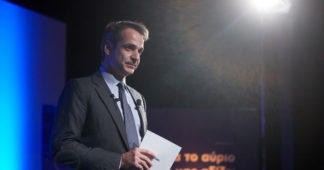By Ugo Realfonzo
Feb 15, 2023
Dubbed the new Greek Watergate, MEPs will discuss the spyware scandal in the European Parliament on Wednesday afternoon. Ahead of the debate, an opposition MEP told The Brussels Times that under-fire Prime Minister Kyriakos Mitsotakis’ spying system could “compete with communist East Germany and the Stasi.”
“Greece is now referred to in the same breath as Hungary and Poland. If we continue on this path we might face sanctions. For this situation, New Democracy is completely responsible,” MEP Stelios Kouloglou (of opposition party Syriza) told The Brussels Times.
The story is gaining momentum in the European Parliament, particularly as the spyware was exposed by the parliament’s IT Services in Brussels during a routine cybersecurity check on the phone of Greek MEP for PASOK, Nikos Androulakis. Since then, the PEGA committee (established to investigate spyware) has been looking into the scandal.
The matter will be debated on Wednesday afternoon, framed under “the erosion of the rule of law in Greece”. It will assess both the wiretapping scandal and general media freedom. With the next election due by July 2023, the political fallout could turn ugly, both domestically and internationally.
A few weeks ago the Greek ruling party, New Democracy, led by Prime Minister Kyriakos Mitsotakis, survived a no-confidence motion put forward by the Syriza opposition party. In protest over the conservative government’s handling of a phone tapping scandal, its leader Alexis Tsipras has since said that his party will abstain from parliamentary votes until a national election is held.
Syriza’s Kouloglou is concerned by the way in which the Greek Government has responded to the scandal and accuses them of having further eroded the rule of law; first by threatening the Independent Data Protection Authority (ADAE), and subsequently by appointing a General-Prosecutor who “instead of investigating the scandal, initially tried to investigate who leaked it to the press.”
The government has insisted that the surveillance of opposition politicians, journalists, business leaders and its own ministers was legal and undertaken for national security purposes. “It is an absurd lie, and it is proven,” Kouloglou stated. “They were spying on the chief of the Armed Forces and many government ministers and officials. If they were a danger to national security, why did they remain in their positions?”
Kouloglou outlines the extent of the surveillance system, adding that Mitsotakis’ government was spying on his own family members, like his own sister and his nephew who is currently the Mayor of Athens. “It was a paranoid system in order to find dirt for everyone and then try to manipulate them.”
Kouloglou strongly rejects Mitsotakis’ legality argument: “He was also using Predator as a parallel system for full surveillance. Predator is clearly illegal. In any other country, the prime minister would have resigned.”
New Democracy deputies have railed against the allegations and anyone supporting them. MEP Eliza Vozemberg on Twitter accused Syriza and its leader Tsipras of “defaming Greece abroad” by provoking a debate in the European Parliament.
In response, Kouloglou stresses that “it is not Syriza who defames Greece internationally but New Democracy with this scandal, the pushbacks, the SLAPPs against journalists and the plummeting media freedom indexes.” Speaking in plenary on Tuesday, Vozemberg denounced MEPs from other Member States who had spoken out about spyware scandal, saying that they are “interfering in the election period” and dismissing their claims as “unsubstantiated.”
“I understand that every MEP of the EPP group, in which New Democracy is a member, is in a difficult position: they have to defend their political party but also their integrity,” Kouloglou said.
When asked about how the ongoing spyware scandal will affect the upcoming elections, Kouloglou says the issue is barely covered by national media. Mitsotakis was widely criticised when press freedom in Greece dropped from 70th to 108th in 2022. Kouglou believes that the vote will be influenced mainly by other issues.
Greeks have other priorities as their country has become one of the poorest in the EU with rampant inflation and with the highest price of gas in Europe. Kouloglou criticised the European Commission for not grasping the scale of the problem: “It participates in the government’s efforts to cover up the scandal.”
While the PEGA committee has produced a report that evidences cases in Spain, Poland, Cyprus and Hungary, Greece is now seen as the “apotheosis of the system.” Kouloglou likened Greece’s political surveillance to that in “communist East Germany and the Stasi.”
Placing citizens under surveillance, Kouloglou says, is having your most intimate moments exposed. This constitutes a wide breach of human rights and freedom of speech. “It deprives a person of the ability to act without being already compromised. It is against democracy and European values. The EU must act swiftly against spyware.”
Also read
Israeli secret services behind surveillance in Greece
We remind our readers that publication of articles on our site does not mean that we agree with what is written. Our policy is to publish anything which we consider of interest, so as to assist our readers in forming their opinions. Sometimes we even publish articles with which we totally disagree, since we believe it is important for our readers to be informed on as wide a spectrum of views as possible.










